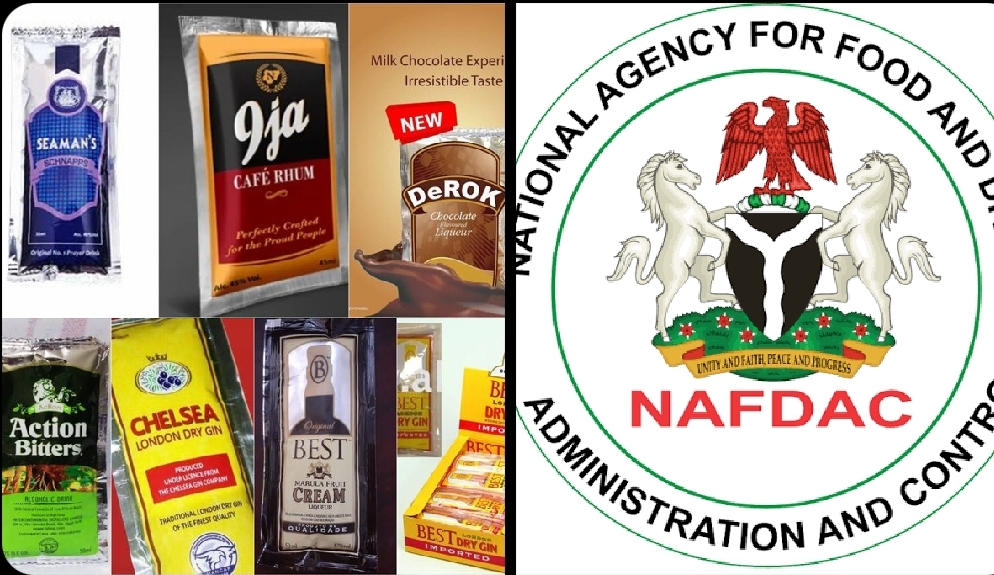
NAFDAC to Ban Sachet Alcohol by December 2025 as Nigeria Faces a National Reckoning Over Youth Drinking Crisis

In what appears to be one of the boldest public health policies Nigeria has witnessed in years, the National Agency for Food and Drug Administration and Control (NAFDAC) has announced that the sale and production of sachet alcohol and bottles under 200ml will be officially banned by December 2025.
The enforcement, which follows a Senate directive, resurrects a long-delayed policy designed to combat the alarming rate of alcohol abuse among Nigerian youths — a crisis that has quietly spread through the nation’s streets, campuses, and low-income communities.
According to multiple reports from reputable outlets such as Vanguard and Punch, NAFDAC confirmed that this decisive move will mark the end of small-sized alcoholic beverages that have become both a cultural symbol of cheap relief and a public health nightmare.
Originally proposed in 2020, the policy was shelved due to intense opposition from industry stakeholders who argued that it would destroy thousands of jobs and cripple local distilleries. But five years later, amid mounting evidence of health and social consequences, the federal government is finally enforcing the ban.
Sachet and small-bottle alcohol — usually sold in plastic pouches or miniature glass bottles for as low as ₦50 — have long been the drink of choice for the underage, commercial drivers, and low-income earners looking for an affordable escape.
Studies show that these easily concealed drinks have fueled a dangerous culture of excessive consumption, often leading to violence, road accidents, and substance dependence.
The World Health Organization’s 2024 Global Status Report on Alcohol and Health revealed that Nigeria ranks among Africa’s highest consumers of alcohol per capita, averaging 11.1 liters annually — an astonishing figure for a country where nearly half the population identifies as non-drinkers for religious reasons.
Public health experts have repeatedly warned that sachet alcohol represents an unregulated gateway to addiction for millions of young Nigerians. In Lagos, Kano, and Port Harcourt, small sachet liquors branded with names like “Opa Oyoyo,” “Bullet,” and “Action Bitters” are found in every street kiosk, motor park, and barbershop refrigerator. With prices cheaper than bottled water, these drinks have blurred the line between casual indulgence and chronic dependence. “It’s destroying the youth silently,” says Dr. Femi Adebayo, a public health analyst based in Abuja. “We’ve seen teenagers as young as 14 drinking on their way to school because it’s easy to hide, cheap, and accessible.”
NAFDAC’s Director-General, Prof. Mojisola Adeyeye, has emphasized that the new regulation is not a witch hunt against manufacturers but a necessary step to protect public health. “Our children’s future must not be sacrificed for profit,” she stated during a recent press briefing. She confirmed that the agency will work with law enforcement and the National Orientation Agency to ensure nationwide compliance and public awareness before the December 2025 deadline.
But the ban has not come without controversy. The Manufacturers Association of Nigeria (MAN) and other industry players argue that millions of small-scale retailers and factory workers will lose their livelihoods. Vendors in local markets across the country have voiced frustration, saying sachet drinks form a major part of their daily sales. “This is what keeps my family fed,” lamented one shop owner in Ibadan. “Government should provide alternatives before banning what poor people depend on.”
Economists predict that while the short-term impact could hurt the informal retail sector, the long-term benefits on health and productivity could outweigh the losses. A similar measure in Kenya in 2017 led to a 20% drop in youth alcohol consumption within five years, according to a 2022 study published in The Lancet. Nigerian policymakers are hoping for a comparable outcome — a gradual shift away from cheap intoxicants toward safer consumption patterns, particularly among the youth demographic.
On social media, the reaction has been a mixture of applause, skepticism, and sarcasm. Some Nigerians praise the government for finally addressing an issue long ignored, while others see it as yet another policy that targets the poor. “The rich drink champagne, the poor drink sachet gin, and the government bans only the poor man’s drink,” one X user wrote in frustration. Another comment read, “This is good for our youth. Too many lives have been wasted on ₦50 madness.”
Beyond the online debates, what stands clear is that this ban could reshape Nigeria’s drinking culture in unprecedented ways. For decades, sachet alcohol symbolized survival, pleasure, and escape for millions navigating the hardships of daily life. Now, it may soon become a relic of an era marked by cheap intoxication and costly consequences.
As the countdown to December 2025 begins, attention will turn to whether NAFDAC can truly enforce the policy amid widespread distribution networks and black-market trade. If it succeeds, it could mark a turning point in Nigeria’s war against substance abuse — and perhaps a small but powerful victory for public health in a nation where cheap relief has too often come at the expense of long-term well-being.
Keyword focus: NAFDAC sachet alcohol ban, Nigeria alcohol policy, sachet drinks, youth substance abuse, December 2025 regulation, WHO alcohol report, Nigeria public health.


